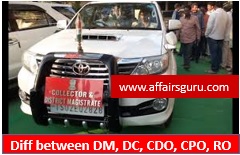Power of District Magistrate (DM) & District Collector (DC) in India
District Magistrate (DM) & District Collector means in hindi is ‘Zila Adhikari‘ & ‘Zilla Collector‘. A District Magistrate (DM) is an IAS officer who is senior most executive magistrate and chief in charge (CIC) of general administration of a district in India.
In some districts, district magistrate works as the district collectors because sometime DM are also responsible for collection of land revenue in the district.

DM or DC works as the office bearer under the supervision of a divisional commissioner (deputy commissioner).
District Magistrate or District Collector (DM or DC) Posting
State govt post the DM or DC from among the IAS officers pool, who are either on Pay Matrix Level 11, 12, or 13 in state. IAS members are directly recruited by UPSC, promoted from State Civil Service (SCS) or nominated from Non-State Civil Service (Non-SCS).
Direct recruits are posted as collector after 5-6 years of services. Promoted members from SCS get this post after promotion to IAS which generally takes two decade of services.
State Government can transfer District Magistrate or Collector to and from the post. These office bearer is usually works as deputy secretary or director in Indian Government.
Post of District Collector was created by Warren Hastings in 1772.
After India Independence, the judicial powers of the collector were transferred to the judicial officers of the district. Also with the launch of Community Development Programme, the collector was also entrusted with the additional work of implementing the government’s development programmes in the district.
District Magistrate (DM) Power and Responsibilities
- Maintenance of law and order
- Co-ordinate with police
- Child Labour/bonded labour related matters.
- Crisis management during riots or external aggression like IPC 144 Usage.
- Conducts criminal court of executive magistrate.
- Supervision of subordinate executive magistracy and conduct magisterial inquiries.
- Supervision of jails and certification of execution of capital sentences.
- Granting arms and ammunition licence under Arms Act.
- Inspection of police stations, prisons and juvenile homes in the district.
- Hearing cases under the preventive section of the Criminal Procedure Code.
- Authorising parole orders to inmates.
- Disaster management during natural calamities such as floods, famines or epidemics like Corona-virus.
- Prepares panel of names for appointment of public prosecutors and additional public prosecutors with consultation with session judge in district.
District Collector (DC) Power and Responsibilities
- Collection of income tax dues, excise duties, irrigation dues and its arrears.
- Conducts revenue court.
- Arbitrator of land acquisition, its assessment and collection of land revenue.
- Issue regarding various kinds of statutory certificates including SC/ST, OBC & EWC, Domicile, Nationality, Marriage, etc.
- Inspection of various district offices, sub divisions and tehsils.
- Registration of Property documents, sale deeds, power of attorneys, defacement, share certificates etc.
- Relief and rehabilitation
- Custodian of evacuee and migrant property
Deputy Commissioner/ District Commissioner Power and Responsibility
- Reports to divisional commissioner on all matters.
- Co-ordination with various local bodies, departments and agencies for proper administration.
Chief Protocol Officer (CPO) Power and Responsibilities
- Conducts the census work
- Supervises the activities of the young government officers in the district and arrange for their training etc.
- Hears and takes adequate steps to redress the grievances of the local people
Chief Development Officer (CDO) Power and Responsibilities
- Conduct all the development plans and projects of the district.
- Act as the chief liaison officer of the state government within the district.
- Put into effect the policy of democratic decentralization.
Returning Officer (RO) Power and Responsibilities
- Conduct all the election works in the district.
- Supervise and coordinate election in the district.
